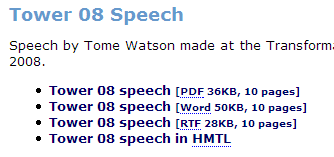I’m reluctant to write this solely on the basis of a piece in the Mail (on Sunday?), but it seems Civil Serf has been identified and suspended by DWP.
Investigators hunting for the blogger summoned her to a meeting last week, when it is understood that she denied responsibility. She was told she was being suspended regardless and, when she was ordered to attend a subsequent meeting with the inquiry team, she finally confessed.
She was caught after the Government dedicated a team of computer experts to track her down across the internet. A source in the DWP said it was an extraordinary outlay of resources as the team was told to clear their desks of everything except their hunt for Civil Serf.
OK, if we try to strip away the inevitable tabloid hyperbole, which isn’t necessarily straightforward… this is almost the worst possible conclusion. Denying responsibility was a bit daft, and probably only made things worse. It also leaves DWP looking just a bit reactionary.
What message are they trying to send, I wonder? And what signals does it send about DWP senior management’s appreciation of the way communications are evolving?
Reminder: DWP takes ownership of the government’s flagship web project in a couple of weeks.

